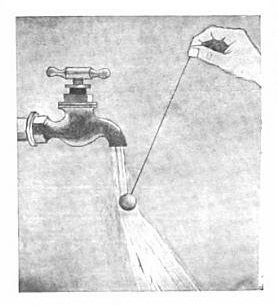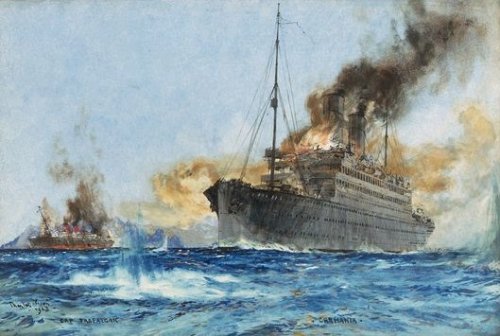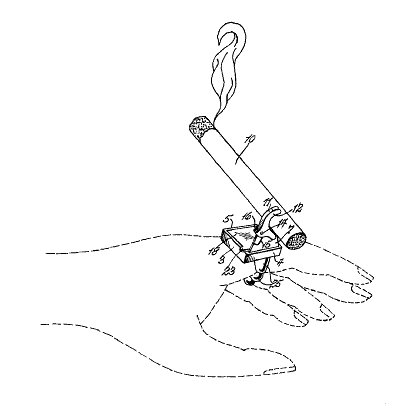
In December 1900, a French committee offered 100,000 francs to the first person to make contact with intelligent beings on another planet.
Martians were excluded as too easy.
(Thanks, Tom.)

In December 1900, a French committee offered 100,000 francs to the first person to make contact with intelligent beings on another planet.
Martians were excluded as too easy.
(Thanks, Tom.)

If a cork ball about an inch in diameter be tied at the end of a thread about a foot in length, and then swung so that it enters a smooth stream of water flowing from a tap at about three inches from the mouth of the latter, it will be found that the ball will remain in the water, and that the thread will make an angle of about thirty degrees with a vertical line passing through the ball. The latter, it should be added, must be thoroughly wetted before this result is produced.
— Strand, September 1908
Court transcript quoted by Rodney Jones in Disorderly Conduct: Verbatim Excerpts From Actual Cases, 1987:
The Court: I got the Quadrophenia, but then he said somebody played in it, and I didn’t get that.
Prosecutor: The Who.
The Court: The what?
Witness: Musicians.
Prosecutor: The Who.
Witness: The Who.
The Court: Who?
Witness: The Who. That’s the name of the band.
The Court: So that’s the name of the group, the Who?
Witness: Yes, the Who.
The Court: Not the What? The Who?
Witness: No, the Who.
The Court: You got it, everybody? The Quadrophenia is a movie with the Who.
Witness: Punk rockers.
The Court: All right.
20864448472975628947226005981267194447042584001 = (2 + 0 + 8 + 6 + 4 + 4 + 4 + 8 + 4 + 7 + 2 + 9 + 7 + 5 + 6 + 2 + 8 + 9 + 4 + 7 + 2 + 2 + 6 + 0 + 0 + 5 + 9 + 8 + 1 + 2 + 6 + 7 + 1 + 9 + 4 + 4 + 4 + 7 + 0 + 4 + 2 + 5 + 8 + 4 + 0 + 0 + 1)20
Achilles-weed is prostrate and grows along the ground at the amazing rate of 10 cm per hour. An exceeding slow tortoise munches one end of the Achilles-weed at the same rate as it grows at the other end. So the tortoise appears to chase the Achilles-weed round the garden. But, strictly speaking, the Achilles-weed does not move at all, it grows and is eaten. Yet its location changes, and it is made up of parts whose location changes (the left and right-hand halves of the Achilles-weed). Hence being made up of parts whose location changes is not sufficient for motion.
— Peter Forrest, “Is Motion Change of Location?”, Analysis, 1984

When World War I broke out in August 1914, Germany enlisted a large ocean liner, the Cap Trafalgar, to attack British merchant ships around Cape Horn. While at a supply base on Trinidade, it was surprised by the HMS Carmania, a British liner that had been similarly pressed into service by the British navy.
The two enormous ships squared off and fought a murderous sea battle. In the end the Cap Trafalgar sank, and the Carmania limped away to a Brazilian port.
An observer might still have wondered which side won — by an ironic coincidence, the Cap Trafalgar had been disguised as the Carmania and the Carmania as the Cap Trafalgar.

This should have caught on — Watson P. Aull’s “cigarette ring,” patented in 1938, clamps a cigarette in a ring worn on the left forefinger, so that the smoker has full use of her hands.
Here’s a related stunt from R.M. Abraham’s Diversions & Pastimes (1933):
“A cigarette may be lit quite easily by holding it 4 or 5 inches above the flame of the match.”
I haven’t tried it.
“I suppose every old scholar has had the experience of reading something in a book which was significant to him, but which he could never find again. Sure he is that he read it there, but no one else ever read it, nor can he find it again, though he buy the book, and ransack every page.” — Emerson
“When we read, we are, we must be, repeating the words to ourselves unconsciously; for how else should we discover, as we have all discovered in our time, that we have been mispronouncing a word which, in fact, we have never spoken? I refer to such words as ‘misled,’ which I, and millions of others when young, supposed to be ‘mizzled.'” — A.A. Milne
“It is one of the oddest things in the world that you can read a page or more and think of something utterly different.” — Christian Morgenstern